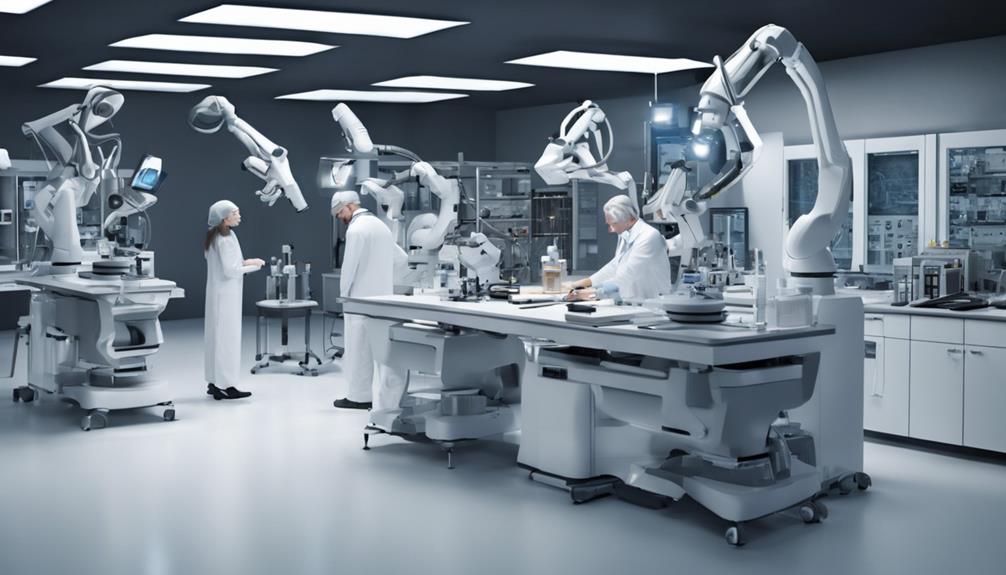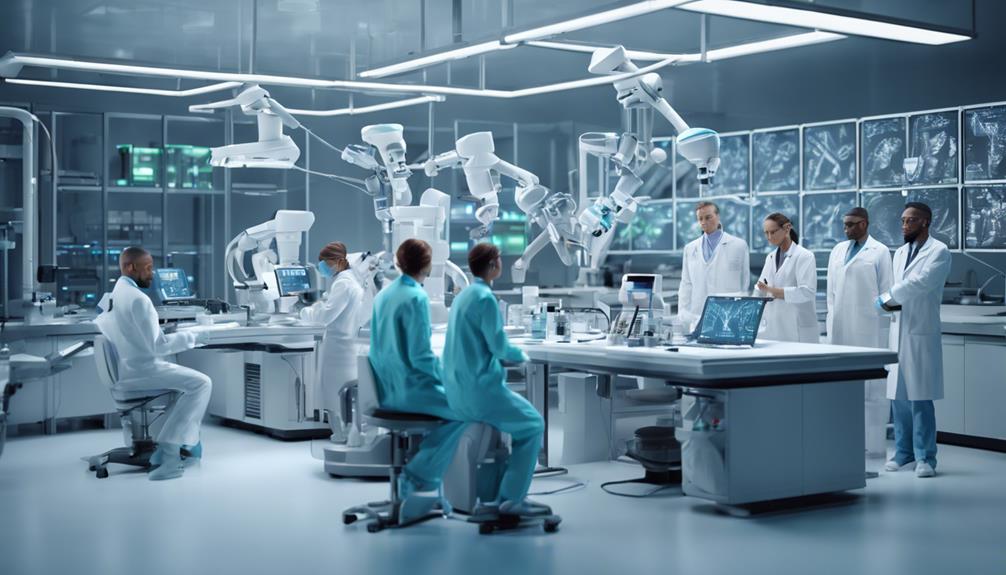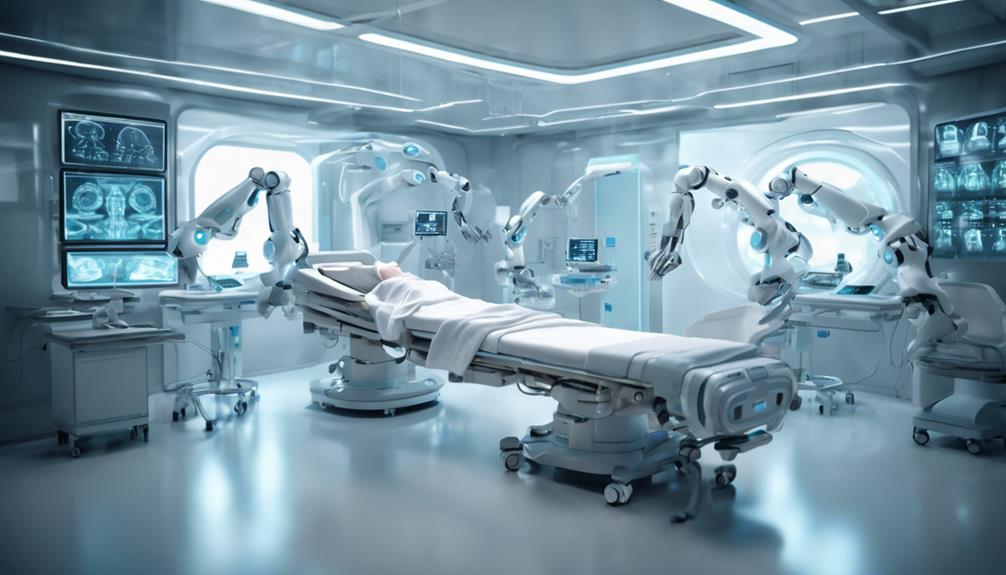
The study of medical technology involves exploring a broad range of innovative tools, devices, and software designed to enhance healthcare. You'll engage with everything from basic stethoscopes to advanced robotic surgical systems, and from MRI scanners to sophisticated data management systems for analyzing patient information. This interdisciplinary field combines elements of engineering, biology, and computer science to improve patient outcomes and streamline medical processes. If you're eager to contribute to transformative changes in healthcare, advancing your knowledge in medical technology offers exciting career opportunities and the potential to make significant impacts in patient care. This could be your gateway to shaping future healthcare solutions.
Defining Medical Technology

Medical technology encompasses the wide array of tools, devices, and software used to diagnose, monitor, and treat medical conditions. It's a field you'll find at the intersection of healthcare and engineering, shaping the way clinicians care for patients.
As part of this dynamic area, you'll encounter everything from simple stethoscopes to complex robotic surgical systems. It's not just about the equipment; it's also about the data management systems that support the analysis of patient information.
You're dealing with innovations that can significantly improve patient outcomes. For example, imaging technologies like MRI and CT scans offer non-invasive ways to look inside the human body, providing crucial information that aids in accurate diagnosis and treatment planning.
Similarly, wearable health devices empower patients to monitor their health conditions in real-time, offering a window into daily function and alerting to potential health issues before they become severe.
In exploring medical technology, you're not just learning about the tools but also how these tools can be integrated into patient care. It's about understanding how technology supports medical professionals and enhances the quality of care provided. This knowledge prepares you to contribute to a field that's as innovative as it's essential.
Historical Evolution
Tracing back through time, the evolution of medical technology reveals a remarkable journey from rudimentary instruments to advanced digital solutions. As you delve into this history, you'll discover that centuries ago, healthcare was primarily driven by trial and error, using tools that were basic yet groundbreaking for their time.
For instance, the first surgical instruments were crafted from stone, and ancient civilizations used these crude tools effectively despite their simplicity.
Moving forward, the Renaissance period marked a significant upturn in medical technology. Innovators like Leonardo da Vinci not only advanced the understanding of human anatomy but also enhanced surgical tools, which greatly improved surgical outcomes.
By the 19th century, you'd observe the introduction of antiseptics by Joseph Lister, revolutionizing surgery by drastically reducing infections.
The 20th century brought about transformative changes with the advent of medical imaging devices, such as X-rays and MRIs, allowing doctors to see inside the human body without surgery for the first time. The development of these technologies was pivotal, providing clearer diagnostics and better patient care.
Today, as you look around, digital technology has taken center stage, integrating complex systems like AI and robotics, which continue to push the boundaries of what's possible in medicine, making treatments more accurate and less invasive.
Core Disciplines

Several core disciplines form the foundation of medical technology, each vital to advancing patient care and treatment efficacy. You'll find that fields such as bioinformatics, biomedical engineering, and clinical laboratory sciences are crucial. They each play distinct, yet interconnected roles in the development and implementation of medical technologies.
In bioinformatics, you're looking at the application of computer technology to manage biological information. Here, the focus is on developing software tools to generate useful biological knowledge. You might be working with genetic sequences to help identify the links between genes and diseases.
Biomedical engineering, on the other hand, merges your knowledge of engineering with medical and biological sciences to design and create equipment, devices, computer systems, and software used in healthcare. This could range from advanced prosthetics to sophisticated imaging systems like MRI machines.
Lastly, clinical laboratory sciences involve analyzing bodily fluids and tissues. As a professional in this field, you'd be directly responsible for producing data that inform clinical decisions. For example, through blood tests, you can detect diseases, monitor health conditions, and help doctors develop treatment plans.
Together, these disciplines ensure you're equipped to tackle complex healthcare challenges, transforming patient care through innovation and expertise.
Educational Pathways
To enter the field of medical technology, you'll need to pursue specific educational paths tailored to your chosen discipline. Typically, you'll start with a bachelor's degree in medical technology, biomedical science, or a related field. These programs provide foundational knowledge in biology, chemistry, and physics, alongside specialized courses in areas like microbiology, clinical chemistry, and hematology.
During your studies, you'll also engage in hands-on laboratory training to build practical skills, critical for your future career. This practical component is essential, as it prepares you to handle complex equipment and conduct accurate tests, which are pivotal aspects of a medical technologist's job.
After obtaining your degree, certification is your next step. You'll need to pass a certification exam from a recognized professional body, such as the American Society for Clinical Pathology. This certification is crucial, as many employers require it, and it demonstrates your competence and readiness to work in the field.
Continuing education is also important in medical technology. You'll find that staying updated with the latest developments and renewing your certification regularly through further coursework or seminars will be necessary to advance in your career and maintain your professional standing.
Key Technologies and Tools

As you delve into the field of medical technology, understanding the key technologies and tools is crucial for your success. You'll encounter a variety of instruments and devices that are essential for diagnosing, treating, and managing medical conditions.
Firstly, imaging technologies like MRI, CT scans, and X-rays are fundamental. They allow you to view the inner workings of the human body in detail, aiding in accurate diagnosis and treatment planning.
You'll also need to familiarize yourself with clinical laboratory equipment which includes analyzers for blood, urine, and genetic material. These devices are pivotal for running tests that detect diseases and monitor health conditions.
Moreover, you'll work with surgical technologies, including minimally invasive robotic systems that enhance precision in surgical procedures, reducing recovery times and improving patient outcomes.
Understanding electronic health records (EHR) systems is also vital. They're used to store and manage patient data efficiently, ensuring accessibility and continuity of care.
Lastly, you'll find that wearable health technology and telemedicine are becoming increasingly important tools in providing patient care remotely, allowing for continuous monitoring of health conditions.
Getting to grips with these will empower you to make informed decisions and provide better patient care.
Current Research Trends
In exploring current research trends in medical technology, you'll notice a strong focus on personalized medicine and AI integration. Personalized medicine, tailored to individual genetic profiles, is revolutionizing treatment plans and drug development, ensuring therapies are more effective and less prone to side effects.
Simultaneously, AI's role in diagnostics and predictive analytics is expanding, with algorithms now capable of analyzing complex medical data at unprecedented speeds.
You'll also find that wearable health devices are pushing the boundaries of patient monitoring and health management. These devices, increasingly sophisticated, collect real-time data on vital signs, allowing for immediate medical interventions and long-term health trend analysis.
This trend not only empowers you with immediate health insights but also feeds into larger databases, enhancing AI's learning capabilities.
Furthermore, the integration of robotics in surgical procedures continues to advance. Robots, guided by surgeons, are enhancing precision in operations, minimizing recovery times, and reducing human error.
This technology not only improves surgical outcomes but also extends the capabilities of surgeons, potentially transforming surgical practices worldwide.
These trends showcase how technology isn't just supporting but actively transforming modern medical practices, making healthcare more personalized, efficient, and accessible.
Career Opportunities

The surge in medical technology has opened up a wealth of career opportunities across various fields. If you're fascinated by the blend of healthcare and innovation, you'll find that roles such as a clinical engineer or a biomedical equipment technician might align perfectly with your interests. These positions allow you to be directly involved in the development and maintenance of medical devices that save lives and improve patient care.
You might also consider a career in medical informatics if you're skilled at analyzing data. Here, you'd work on improving patient outcomes by developing software solutions or enhancing existing systems to manage medical information more efficiently. It's a field that's constantly evolving, offering you endless opportunities to grow and innovate.
Moreover, roles in regulatory affairs are crucial as they ensure that products meet necessary legal and ethical standards before they reach the market. You'd be responsible for navigating complex regulatory landscapes, a critical role that balances innovation with compliance.
Lastly, sales and training positions in medical technology companies are vital. They not only drive the commercial success of products but also educate healthcare professionals on the latest technologies. These roles require excellent communication skills and a thorough understanding of the products you're representing.
Ethical Considerations
While exploring career opportunities in medical technology, you must also consider the ethical implications these technologies can bring to patient care and privacy. As you delve deeper, you'll realize that every innovation carries potential ethical dilemmas.
For instance, the development of genetic testing technology raises concerns about consent and the right to not know one's genetic information. You're tasked with navigating these complex issues, ensuring that patient autonomy and confidentiality are upheld.
Moreover, the use of AI in diagnostics demands rigorous scrutiny. While these systems can significantly improve the accuracy and speed of diagnoses, you need to ask yourself about the accountability in case of errors. Who's responsible when an AI system misdiagnoses a patient?
It's crucial that you understand these layers of responsibility and advocate for clear guidelines that protect both patients and healthcare providers.
Lastly, consider the impact of wearable health devices. These gadgets collect vast amounts of personal health data. You've got to ensure that this data is handled with the utmost privacy and security. The potential for data breaches or misuse is real, and it's your job to champion for robust protections.
Future of Medical Technology

You must now explore how emerging technologies will shape the future landscape of medical care and patient interaction. From artificial intelligence (AI) to robotics, innovations are set to revolutionize the way you receive healthcare.
Imagine visiting a doctor who's equipped with AI capable of analyzing vast amounts of medical data in seconds. This isn't just about faster diagnoses; it's about more accurate, personalized treatment plans that consider your unique genetic makeup. You'll benefit from treatments that are precisely tailored, potentially improving outcomes and reducing side effects.
Robotics, too, will transform your healthcare experience. Surgical robots, already in use, are becoming more sophisticated. They can perform complex procedures with precision beyond human capabilities, which means less invasive surgery, quicker recovery times, and reduced risk of infection for you.
Wearable technology will monitor your health continuously, not just during doctor visits. You'll get real-time feedback about your physical condition, empowering you to manage your health proactively.
Telemedicine will continue to expand, allowing you more frequent and convenient access to healthcare professionals, especially in remote or underserved areas. It's about bringing the doctor's expertise to you, wherever you are, making healthcare more accessible than ever.
Frequently Asked Questions
How Much Does a Medical Technologist Typically Earn Annually?
You're wondering about the salary of a medical technologist? Typically, you can expect to earn between $50,000 and $70,000 annually, depending on experience, location, and the specific healthcare facility where you work.
What Are Common Challenges Faced by Medical Technologists?
As a medical technologist, you'll face challenges like keeping up with rapid technological advancements, managing work-related stress, and maintaining accuracy under pressure to ensure reliable test results in critical healthcare situations.
Can Medical Technologists Work From Home?
Yes, you can work from home as a medical technologist, especially in roles focused on data analysis, consulting, or telemedicine. However, many positions require lab presence for hands-on testing and sample processing.
How Does Medical Technology Impact Patient Privacy?
Medical technology can compromise your privacy by increasing data breaches risks, yet it also offers secure ways to store and share your health information, balancing between advancing healthcare and protecting personal data.
What Are the Typical Work Hours for Medical Technologists?
As a medical technologist, you'll typically work 40 hours a week, often including weekends, evenings, or nights due to the around-the-clock needs of clinical laboratories and hospitals. Shifts can vary widely.
Conclusion
As you explore the realm of medical technology, you're diving into a field that shapes lives. Your journey could revolutionize healthcare through cutting-edge tools and innovations.
Stay informed about emerging trends and ethical considerations to make impactful decisions. Whether you aim to develop new devices or improve patient care, your expertise will be crucial.
Embrace the challenge, and you might just be at the forefront of the next big breakthrough in medical technology.






